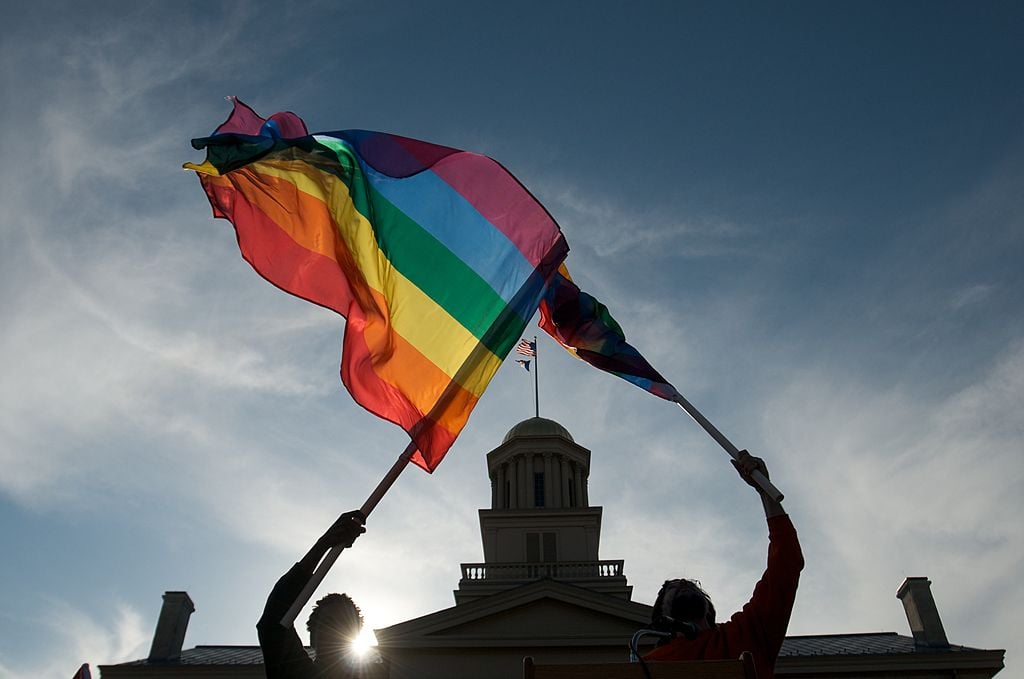In the latest in a series of victories for trans and queer people in statehouses across the United States, Iowa’s legislature has adjourned sine die without passing a single piece of explicitly anti-LGBTQ+ legislation. This is despite more than 20 bills being introduced targeting LGBTQ+ individuals, including some introduced and prioritized by the governor herself. Other states, which have historically shown a willingness to pass LGBTQ+ legislation, have also failed in efforts to pass such legislation this year, including Florida, Georgia, and West Virginia. This is leaving some to wonder if anti-trans and anti-queer politics are beginning to run into resistance, at least in the lead-up to the 2024 election fight.
This year, Iowa was at the center of numerous debates over anti-LGBTQ+ legislation, particularly targeting transgender individuals. One bill aimed to remove transgender people from the state’s civil rights code and declare them “disabled.” Another proposal, known as the “pink triangle bill,” would have required special gender markers on the birth certificates and driver’s licenses of transgender people. One bill would have redefined “equal” to no longer mean “same” or “identical” for transgender people. A further measure sought to ban transgender individuals from restrooms that match their gender identity. Nonetheless, all of these bills failed to pass as the legislature reached its closing hours.
This is not due to a lack of effort by a handful of Republican legislators who saw this as their priority issue. In the final moments of the session, sensing defeat, Republicans attempted to pass an anti-transgender birth certificate bill by introducing an amendment to ban such certificates onto a bill supporting the loved ones of fallen veterans. Perhaps realizing that such a move would likely be seen as politically unpopular, they withdrew the amendment before the legislature adjourned.
Over 20 bills targeting the LGBTQ+ community that were introduced this year died. Counting rollover bills from the previous year, Iowa Safe Schools states that number is as high as 39 bills that have been defeated. The only bills to pass was a broad “religious freedom restoration act,” which could allow broad discrimination against LGBTQ+ people and many other classes of people using religion as a shield, as well as a DEI ban. Though both bills have negative impacts on LGBTQ+ people, neither bill contained the targeted provisions seen in several others that were introduced this year.
Iowa has been the site of fierce resistance to anti-LGBTQ+ legislation this year. For one piece of legislation removing transgender people from the state civil rights code, over 300 people lined up in the hallway to speak out against the bill. When the bill was defeated in committee, cheers could be heard throughout the hallway. Responding to that bills defeat at the time, Damian Thompson of Iowa Safe Schools stated, “From what I can tell, opposition was overwhelming, before the hearing, during the hearing, and after the hearing.” He later added, “This is the kind of response we need to see with every anti-LGBTQ legislation. We need the entire community united in opposition. What they are trying to do, we’ve seen it, they are trying to divide us. The LGB against the T, and it’s not going to work.”
Iowa is not the only state to witness significant victories over anti-LGBTQ+ and anti-trans legislation this year. Earlier, all explicitly anti-LGBTQ+ bills — 20 in total — were defeated in Florida, prompting a statement from local HRC advocates that “The tide is turning.” Similarly, over 20 bills failed in West Virginia, leading to celebrations. In Georgia, every anti-LGBTQ+ bill also failed, despite similar last-minute attempts to amend anti-LGBTQ+ legislation into entirely unrelated bills.
Although attacks on trans and queer individuals have encountered significant obstacles in Iowa and other states historically targeting LGBTQ+ people, some states are advancing with particularly severe legislation. These states include Tennessee, Alabama, Mississippi, and Louisiana, all of which have introduced bills that would ban transgender people from bathrooms, allow individuals with religious objections to adopt LGBTQ+ children, and more. Meanwhile, Ohio is moving forward with a bathroom ban that could affect transgender adults in colleges, and Utah has already passed a sweeping bathroom and locker room ban this year. Additionally, the United States presidential election is already witnessing political attacks on transgender individuals, which may intensify in the coming months.
For transgender Iowans, however, any further attacks will have to wait until the outcomes of the 2024 election cycle are clear. Early indications from Iowa suggest that such attacks may not be politically popular in the state. For example, Moms For Liberty candidates were defeated in 12 of 13 highly contested school board elections in the state in 2023. Additionally, Pella, Iowa — a town that favored Trump by over 35 points — defeated a local book ban. If similar election results occur in 2024, then attacks on LGBTQ+ individuals may continue to falter in the state, giving its trans and queer residents a moment to breathe as they begin the long battle to roll back harsh laws targeting LGBTQ+ people enacted in recent years.
